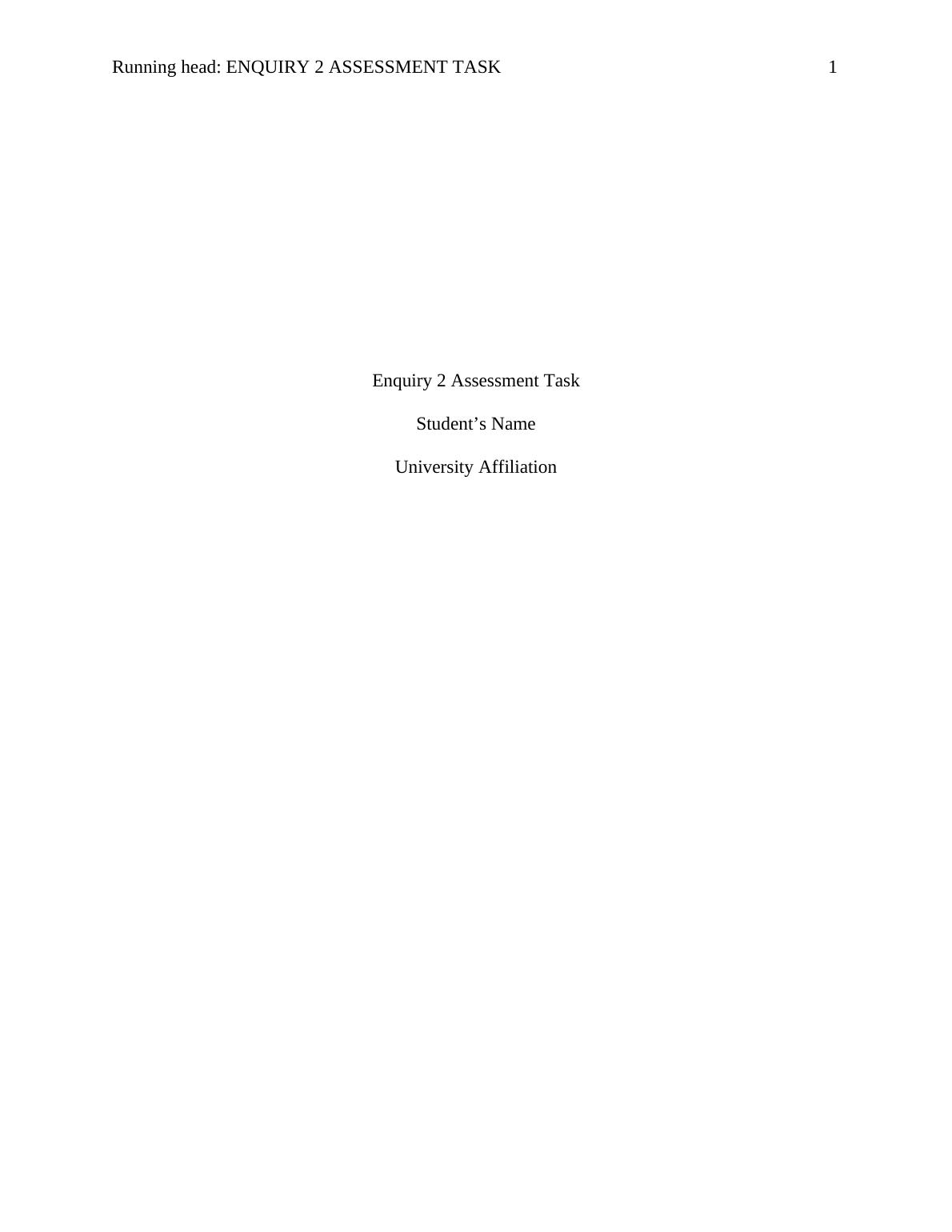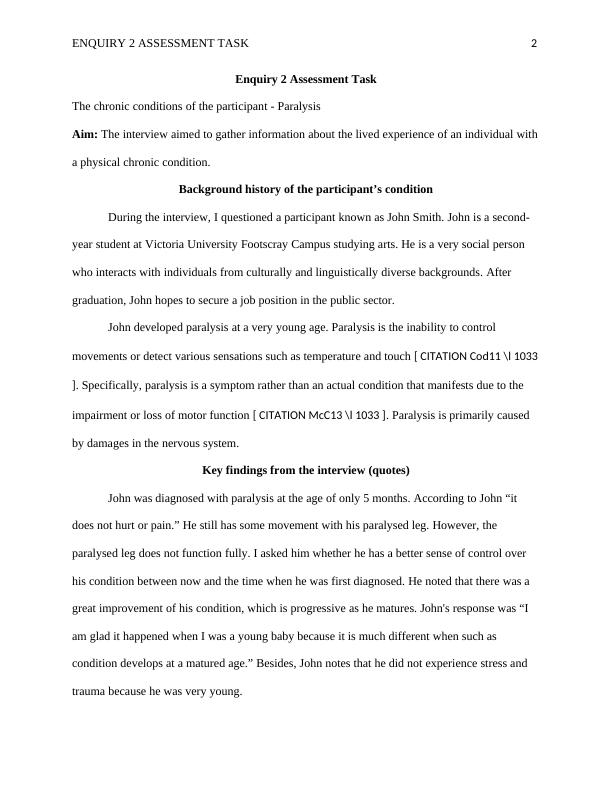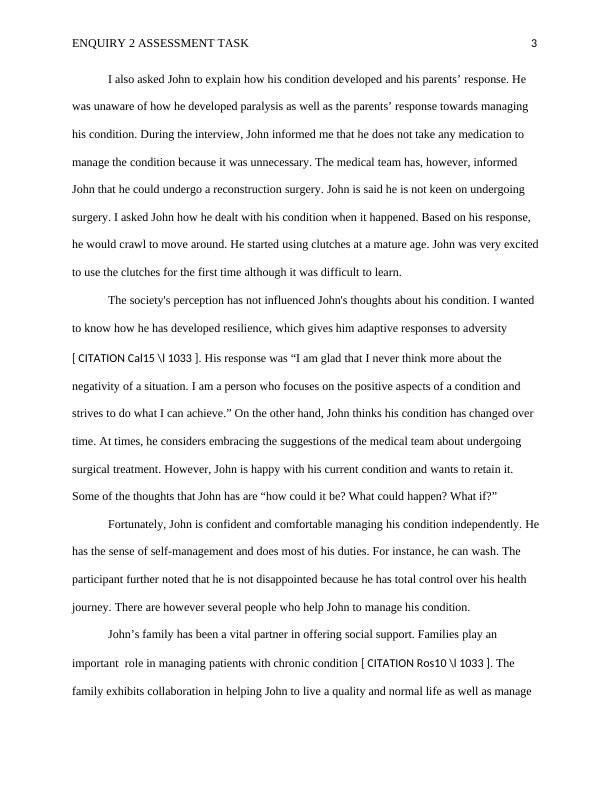Ask a question from expert
PHE2LCI - Living with Chronic Conditions
8 Pages1903 Words308 Views
La Trobe University
PHE2LCI - Living with Chronic Conditions (PHE2LCI)
Added on 2019-11-08
PHE2LCI - Living with Chronic Conditions
La Trobe University
PHE2LCI - Living with Chronic Conditions (PHE2LCI)
Added on 2019-11-08
BookmarkShareRelated Documents
Running head: ENQUIRY 2 ASSESSMENT TASK 1Enquiry 2 Assessment TaskStudent’s NameUniversity Affiliation

ENQUIRY 2 ASSESSMENT TASK 2Enquiry 2 Assessment TaskThe chronic conditions of the participant - Paralysis Aim: The interview aimed to gather information about the lived experience of an individual witha physical chronic condition. Background history of the participant’s conditionDuring the interview, I questioned a participant known as John Smith. John is a second-year student at Victoria University Footscray Campus studying arts. He is a very social person who interacts with individuals from culturally and linguistically diverse backgrounds. After graduation, John hopes to secure a job position in the public sector. John developed paralysis at a very young age. Paralysis is the inability to control movements or detect various sensations such as temperature and touch [ CITATION Cod11 \l 1033]. Specifically, paralysis is a symptom rather than an actual condition that manifests due to the impairment or loss of motor function[ CITATION McC13 \l 1033 ]. Paralysis is primarily caused by damages in the nervous system. Key findings from the interview (quotes)John was diagnosed with paralysis at the age of only 5 months. According to John “it does not hurt or pain.” He still has some movement with his paralysed leg. However, the paralysed leg does not function fully. I asked him whether he has a better sense of control over his condition between now and the time when he was first diagnosed. He noted that there was a great improvement of his condition, which is progressive as he matures. John's response was “I am glad it happened when I was a young baby because it is much different when such as condition develops at a matured age.” Besides, John notes that he did not experience stress and trauma because he was very young.

ENQUIRY 2 ASSESSMENT TASK 3I also asked John to explain how his condition developed and his parents’ response. He was unaware of how he developed paralysis as well as the parents’ response towards managing his condition. During the interview, John informed me that he does not take any medication to manage the condition because it was unnecessary. The medical team has, however, informed John that he could undergo a reconstruction surgery. John is said he is not keen on undergoing surgery. I asked John how he dealt with his condition when it happened. Based on his response, he would crawl to move around. He started using clutches at a mature age. John was very excitedto use the clutches for the first time although it was difficult to learn. The society's perception has not influenced John's thoughts about his condition. I wanted to know how he has developed resilience, which gives him adaptive responses to adversity[ CITATION Cal15 \l 1033 ]. His response was “I am glad that I never think more about the negativity of a situation. I am a person who focuses on the positive aspects of a condition and strives to do what I can achieve.” On the other hand, John thinks his condition has changed over time. At times, he considers embracing the suggestions of the medical team about undergoing surgical treatment. However, John is happy with his current condition and wants to retain it. Some of the thoughts that John has are “how could it be? What could happen? What if?”Fortunately, John is confident and comfortable managing his condition independently. Hehas the sense of self-management and does most of his duties. For instance, he can wash. The participant further noted that he is not disappointed because he has total control over his health journey. There are however several people who help John to manage his condition. John’s family has been a vital partner in offering social support. Families play an important role in managing patients with chronic condition [ CITATION Ros10 \l 1033 ]. The family exhibits collaboration in helping John to live a quality and normal life as well as manage

End of preview
Want to access all the pages? Upload your documents or become a member.